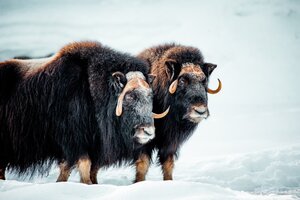
Study of 'spatial synchrony' using long-term data exposes ecological trends and could boost conservation, farming
Populations of animals and plants separated by even thousands of miles can rise and fall together...

Tick researchers identify new strain of Rickettsia bacteria that causes spotted fever infections in humans
In a residential backyard in Maine, Project ITCH researchers from the University of Massachusetts Amherst stumbled...

Wild bonobos study reveals that females team up to maintain power in their societies
Biologically speaking, female and male bonobos have a weird relationship. First, there's the sex. It's the...

Climate change is now the leading threat to imperiled species, new study finds
Authors of an article in BioScience reveal that climate change has become the most pervasive threat...

Global estimate finds mangrove forests nurture vast populations of commercially important marine species
An international team of researchers with a variety of backgrounds has worked together to calculate a...
Paying fishers to release endangered catches could aid conservation
A new study from the University of Oxford has revealed that an incentive program increased live...
Global map reveals seagrass meadows under threat—even inside protected areas
A new global analysis finds that many of the world's most threatened seagrass meadows lie within...
Yeast DNA reveals ties to human migration and the last ice age
Yeast is already a familiar ingredient to bakers and winemakers, but new research from the University...
What rattlesnake venom can teach us about evolution
Researchers at the University of South Florida are uncovering new clues about how animals evolve by...
Big brains and big ranges might not save birds from climate change
Biologists have long debated why some plants and animals can adjust to a wide range of...
Fishing bans can help kelp forests withstand marine heat waves
Marine heat waves that seemed extreme just a decade ago will become commonplace by the end...
Oil cleanup agents do not impede natural biodegradation, research reveals
Using spill-treating agents to clean up oil spills does not significantly hinder naturally occurring oil biodegradation,...
Insects are disappearing due to agriculture—and many other drivers, research reveals
Insects are disappearing at an alarming rate worldwide, but why? Agricultural intensification tops the list of...

Non-native trees gain ground in eastern US, reducing native species diversity
In the largest study of its kind, researchers at the Florida Museum of Natural History have...
Discovering 'pirate parasitism': Wasps can successfully exploit unsuitable hosts with help from another species
Parasitoid wasps sometimes lay eggs in unsuitable host insects, a behavior that has traditionally been considered...
Curious isolation: New butterfly species discovered
In the heart of Canada's Rocky Mountains, an unassuming yet remarkable butterfly has been quietly flying...
Simulations predict how pesticides may affect honeybee colonies
Honeybees are essential pollinators for agriculture and natural ecosystems. Stressors like climate change, habitat loss and...
A new record for California's highest-elevation tree: Jeffrey pine found in High Sierra
UC Davis Professor Hugh Safford was hiking for pleasure in California's High Sierra when he stumbled...
Personality test for bees: Research reveals differences in honey bee defense behavior within same colony
Researchers from the Cluster of Excellence Collective Behavior at the University of Konstanz have discovered that...
Gorillas in Congo's Nouabalé-Ndoki National Park scratch the ground for truffles, not for insects as long assumed
A recently published paper reveals that soil scratching by gorillas in Congo's Nouabalé-Ndoki National Park is...
Team captures first confirmed footage of a baby colossal squid
An international team of scientists and crew on board Schmidt Ocean Institute's research vessel Falkor (too)...
Woodrats' immunity to snake venom changes with the weather, researchers discover
The power of a rattlesnake's venom to incapacitate its prey may depend on more than just...

New pollen-replacing food for honey bees brings hope for survival
Scientists have unveiled a new food source designed to sustain honey bee colonies indefinitely without natural...

Foraging on the wing: How can ecologically similar birds live together?
A spat between birds at a backyard birdfeeder highlights the sometimes fierce competition for resources that...

Bumble bee decline tied to air pollution's disruption of gut microbiome
A study of bumble bees has uncovered a potential reason for the insects' decline. By studying...

Shrews shrink in winter to conserve energy, study finds
Newly published research from UNC Greensboro biology professor Dr. Bryan McLean and colleagues shows that the...
To avoid parasites, some fruit flies sacrifice sleep
If you think doomscrolling leads to sleepless nights, imagine waking up in bed with a blood-sucking...
Fishing for cephalopod DNA allows for efficient marine surveying
A new DNA probes allow for efficient surveying of the hidden lives of squids and octopuses...
Six decades of research bias: Fancy birds steal the spotlight, leaving drab species understudied
If you like watching, reading, or learning about pretty, colorful birds, you're not alone. But it...

'Internet of nature' helps researchers explore the web of life
A novel paper led by Dr. Ulrich Brose of the German Center for Integrative Biodiversity Research...

Global fisheries' nutrient extraction threatens ocean ecosystems and productivity, study finds
The four billion tons of marine organisms that global fisheries extracted from the ocean between 1960...

Hantavirus hotspots revealed: Six new rodent species identified as carriers
Hantavirus recently made news headlines as the cause of death for Betsy Arakawa, the wife of...

Venom characteristics of a deadly snake can be predicted from local climate
Local climate can be used to predict the venom characteristics of a deadly snake that is...

Pharmaceutical pollution alters migration behavior in salmon, study shows
In the largest study of its kind to date, a team of international researchers has investigated...

Bumblebee survival: Keeping killer moths at bay with strategic hive spacing
A study published in Frontiers in Bee Science has shown that physical distance plays a leading...

Two new tapeworm species discovered in wild oval squid
Researchers from the Physics and Biology Unit at the Okinawa Institute of Science and Technology (OIST)...

Who eats whom? New model for marine food webs calculates predator-prey relationships more precisely
Marine food webs are highly complex. Until now, researchers have been unable to understand exactly how...

In Croatia's freshwater lakes, 'selfish' bacteria hoard nutrients
Bacteria play key roles in degrading organic matter, both in the soil and in aquatic ecosystems....
Highly endangered sunflower star finds refuge in Canadian fjords
A team of oceanographers and marine biologists at the Hakai Institute, working with a colleague from...
Can we really resurrect extinct animals, or are we just creating hi-tech lookalikes?
From dire wolves to woolly mammoths, the idea of resurrecting extinct species has captured the public...
Caspian Sea's rapid decline threatens endangered seals, coastal communities and industry, study warns
Water levels in the Caspian Sea—the world's largest landlocked water body—are getting lower, as hotter temperatures...
Love songs in the sand: Researchers listen in to fiddler crab courtship
For the first time, a study led by University of Oxford researchers has listened in to...
Coral reefs exude myriad chemicals, fueling dynamic microbial recycling of nutrients
New research reveals the remarkable chemical diversity of substances exuded by coral reefs and demonstrates that...
Even a sublethal insecticide dose may disrupt the pollinator mating process
Insecticides can help protect crops against troublesome pests, but they also pose a risk for beneficial...
Parasites shrink starlings' range, impacting next generation's survival
Infections with parasites often entail no recognizable signs in many wildlife species, but can still have...
Light pollution stimulates cyanobacterial growth and metabolic processes in lakes, large-scale experiment shows
Everyone is familiar with the light dome that shows from afar where cities are brightly lit...
Predicting animal movements under global change
On our planet, at any one moment, billions of animals are on the move. From migratory...
Study finds evidence that prehistoric rhinos lived in huge herds
Rhinos that flourished across much of North America 12 million years ago gathered in huge herds,...
Farmers brought fish up the mountains of Europe as early as the 7th century, ancient DNA reveals
Ancient DNA extracted from a sediment core from a high-altitude Pyrenean lake in Spain reveals that...
International team calls for new approach to estimate crop yield potential and gaps
An international team of agronomists is calling for a new approach to estimate crop yield potential...



